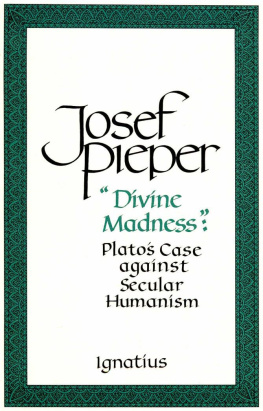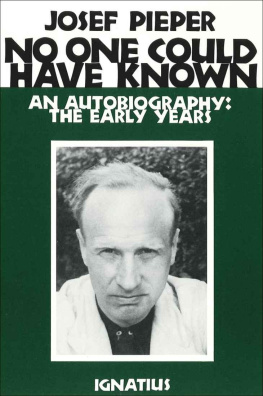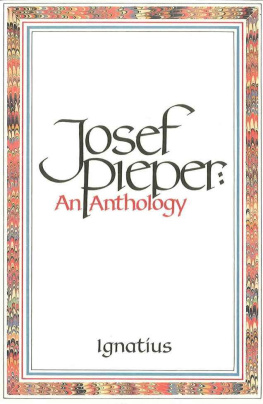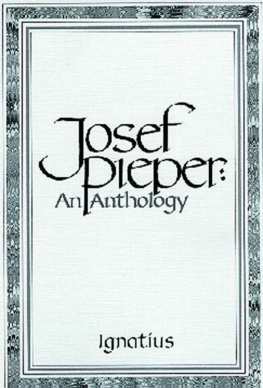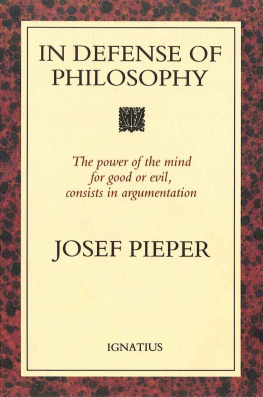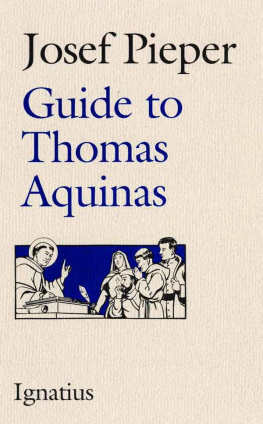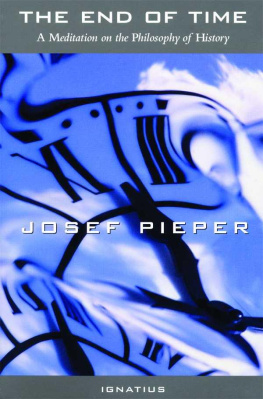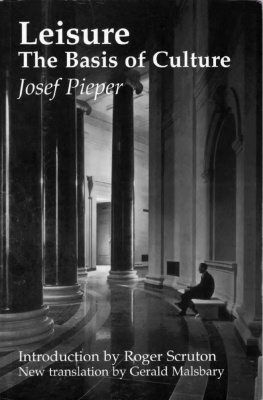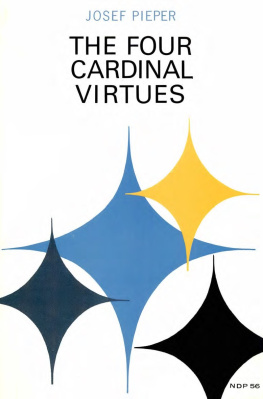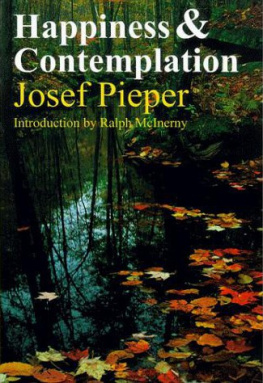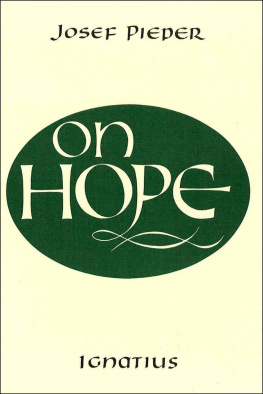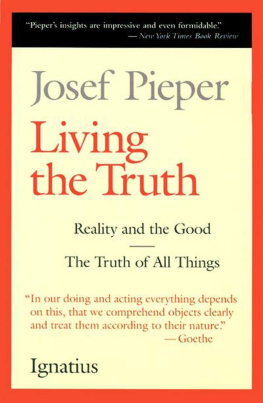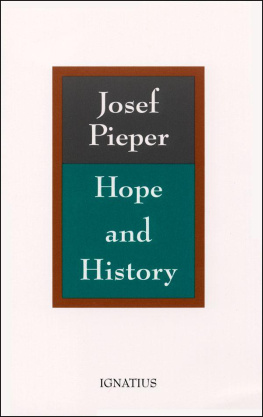The interpretation offered here focuses on Plato's thesis, which at first sight appears strange and unrealistic, that those experiences that advance human life to its true fullness are bestowed on us only during a god-given state of being-beside-oneself. This thesis is then resolutely confronted with our contemporary and above all psychoanalytical knowledge of man's nature, as well as with the Christian conception of man's existence, thus revealing its amazing, unexpected relevance."It is quite evident that the present time especially cries out for a keener awareness of the Socratic-Platonic wisdom as discussed in this essay It cries out for resistance to the attempt and the temptation to establish the autocratic rule of man, who deludes himself that he possesses sovereign powers over the world and over himself and thus squanders his real existential patrimony."Such patrimony is achieved and preserved only through a willingly accepted openness: openness for divine revelation, for the salutary pain of catharsis, for the recollecting power of the fine arts, for the emotional shock brought about by eros and caritas in short, through the attitude rooted in the mysterious experience that Plato called theia mania.' Josef Pieper
"Divine Madness"
JOSEF PIEPER
''Divine Madness''
Plato 's Case against Secular Humanism
Translated by Lothar Krauth
IGNATIUS PRESS SAN FRANCISCO
Title of the German original: "Gttlicher Wahnsinn"
Eine Platon-Interpretation 1989 Schwabenverlag AG Ostfildern/Stuttgart, Germany
Cover by Roxanne Mei Lum
1995 Ignatius Press, San Francisco All rights reserved ISBN 0-89870-557-6 Library of Congress catalogue number 95-75667 Printed in the United States of America
Contents
ESTABLISHING THE THEME
" T HE HIGHEST GOODS come to US in the manner of the mania, inasmuch as the same is bestowed on us as a divine gift." This pronouncement by Socrates with its central term mania remaining untranslated for now contains an entire world view; it proclaims above all a fundamental opinion about the meaning of human existence. It shows that man is indeed of such a kind as to possess his own self in freedom and self-determination, that he is able and also obliged to examine critically everything he encounters, that he is above all able and obliged to determine, based on insight, his own life. Yet it further indicates that man, at the same time, is in his personal selfhood integrated into the whole of reality in such a way that he can very well be shaken out of his self-possession, and this not only in the form of forced oppression but possibly, so long as man on his part does not barricade himself in refusal, also in such a form that in the very loss of self-possession there is bestowed on him a fulfillment not achieved in any other way.
This concept of man, with the tension of its structure, can of course never be captured in some smooth formula; its inherent explosive potential indicates, rather, an implacable and disturbing challenge. And this concept of man, in a unique way, occupied Plato's mind all his life. Yet he was far from placing his emphasis on the same aspect. Like every true philosopher, he was concerned not so much with finding some satisfying and handy formula as with not overlooking anything. Thus he never denied or disregarded the fact that both aspects are essential to man, self-possession as well as its loss through the irruption of a higher power. But he was not always disposed to interpret such loss of self-directed autonomy as a gain.In his earlier writings, he seems inclined to call the state of "being-beside-oneself-in-enthusiasm" a "sickness", even though he would have considered it a worse sickness not to be able to be "sick" in such a way. ("The sickness that consists in the inability to be sick" this expression of modern psychology comes to mind.)
The following reflections are an attempt to interpret primarily the late Dialogue Phaedrus. In this Dialogue, Socrates discusses four different forms of the theia mania, by which he means precisely this god-given state of "being-beside-oneself".
PROPHECY
T HE FIRST DISCUSSION concerns prophetic ecstasy, "divination" in the strict sense, the transport prophtique. Three figures are identified by name: the prophetess at Delphi, the priestesses of Dodona, and the Sibyl. They all have in common that, while they were in a state of ecstatic frenzy, they accomplished great things through their utterances, but, when they were of clear mind and calm self-possession, they were unable to say anything important.At the time of Socrates, Delphi had been a sanctuary for more than a thousand years, extending its influence far into Asia and Egypt. Regardless of the interpretation of details, we now know that the effects of the Delphian Oracle, especially when aimed at the political arena, can hardly be overestimated. Its oracles contained religious and ethical demands found practically nowhere else in the pre-Christian world formulated with such consistency and intensity. For example, not only is the inviolable right to asylum proclaimed here, and not only is the custom of the blood feud denounced, but the earliest rules for a more humane conduct of war, indeed for some kind of "international law", can also be traced back to the Delphian Oracle.The most ancient formulaic hymnic wisdom of the Greek religion originated with the priestesses of Dodona in northern Greece: "Zeus was, Zeus is, and Zeus will ever be O Zeus, thou art most powerful!" All too easily do we tend to overlook such things in favor of those entertaining stories about the gods of the Homeric mythology, stories that Plato dismisses as a perversion of the true divine doctrine according to the Greek conception, of course.And finally, the Sibyl. The most ancient testimony known to us derives from one of the great pre-Socratic philosophers, Heraclitus; it is itself cast in Sibylline obscurity: "The Sibyl, with raging lips uttering things unamusing, and unadorned, and unanointed, resounds through the millennia, driven by the god."Plato's contemporaries are so familiar with all this that the text states explicitly: Let us not talk at length about things known to everybody. And then, recapitulating, the text says it would be good to reflect on the fact that the ancients, who gave names to all things, assigned to this oracular art of the seer-priestess and the Sibyl the name mania as a name of honor. A few lines later, this title is confirmed once again: the ancient ones testified that more venerable than human reasonableness is the theia mania, the god-given and enthusiastic state of being-beside-oneself.We latter-day readers of Plato are at first inclined to connect the Platonic commentary on the prophetic trance only with Delphi, Dodona, and the Sibyl, therefore with the "history of Greek religion" and thus to let it rest. Surveying the academic literature on Plato, we are largely confirmed and encouraged in this approach. But in doing this we deprive ourselves of the genuine gain we might very well derive from studying Plato's words or even simply reading them attentively. I am reminded here of C. S. Lewis' Screwtape Letters. A devil called "Screwtape", grown "wise" through extensive experience, imparts instructions and advice to his nephew, inexperienced in the ways of humans, in letters expressing a philosophical anthropology altogether as humorous as it is profound but, of course, turned upside down. One of Screwtape's letters deals with studying the ancients:
"Only the learned read old books, and we [the united demons of hell] have now so dealt with the learned that they are of all men the least likely to acquire wisdom by doing so. We have done this by inculcating The Historical Point of View. Put briefly, The Historical Point of View means that when a learned man is presented with any statement in an ancient author, the one question he never asks is whether it is true. He asks who influenced the ancient writer, and how far the statement is consistent with what he said in other books, and what phase in the writer's development, or in the general history of thought, it illustrates, and how it affected later writers, and how often it was misunderstood (specially by the learned man's own colleagues)...", and so forth.
Next page
